#monotonous-minutia does lit crit
Text
because I think of it altogether too much, some dialogue on the differences in the role of the Muse in Les contes d’Hoffmann, in the play versus in the opera. Enjoy my nerdy, disorganized, former-literature-major ramblings as I spend altogether too much time picking apart the minutia of this issue (but hey, it’s in my URL, so).
In the original play by Michael Carré and Jules Barbier (the same people who wrote the libretto for the opera), the Muse doesn’t double as Niklausse. We get two separate characters–the Muse and Hoffmann’s sidekick, Friédrick.
The play opens with a monologue from the Muse, similar to the one in the opera (some lines are taken verbatim). The monologue in the play, though, isn’t about the Muse being mad at Stella and wanting to win Hoffman’s love. It is in a lot of ways a love letter to the real Hoffmann’s writing, of which Carré was a huge fan (obviously, he wrote a whole play about them). The works of E.T. A. Hoffmann were (and to an extent, still are) hailed as being unique, strange, and otherworldy compared to most of what was seen at the time. The Muse here talks about her stories as if they’re her own, and she happens upon Hoffmann in the tavern (read: when he gets drunk, he gets inspired to write weird stuff). She’s here, then, to introduce this story–the play that we’re watching/reading–as one of her own. She does reappear at the end and makes a statement similar to that made at the conclusion of the opera, that the poet had to suffer to be truly great and now that he’s given up on love she has him to herself–but it’s not that she specifically tried to make this happen, she’s just pleased that it did.
After the Muse’s opening monologue, she tells the audience that the people are coming and she’s going to hide, because they scare her. She puts on a suit and hat similar to that warn by the students that will soon be populating the tavern, so she can blend in with them and not be noticed. I’m guessing this is where the inspiration for the Muse also being Niklausse eventually (partially) comes from.
But we don’t have Niklausse in the play; we get Friédrick. Friédrick is, in my perception, ridiculously adorable. He spends a good portion of the play serving sass. There’s a ton of banter between him and Hoffmann, and some with Friédrick and the side characters as well as they collectively role their eyes at Hoffmann. So, much similarity to Niklausse. A few differences, though: the guys in the tavern love making fun of him, because he’s younger, and Hoffmann is even a little bit meaner to him than their operatic counterparts, and Friédrick is just kind of resigned to it, though he does make fun of Hoffmann at times. Mostly he feels sorry for him and feels the need to take care of him, as he can’t seem to take care of himself.
Friédrick is referred to as Hoffmann’ “shadow,” in that he follows him around everywhere making sure he doesn’t get himself arrested or shanked. He is also referred to by Hoffmann as “the voice of reason” through all his adventures, though of course Friédrick doesn’t remember any of them, since they didn’t actually happen. But he is constantly dragging Hoffmann out of trouble in these stories, which is why Dappertutto tries to off him in the Giulietta act. Dappertutto is annoyed that Friédrick first rescues Hoffmann from Olympia when she goes crazy (which is a big part of the play, and written into the libretto, but rarely ever portrayed on stage for the opera), then saves him from Crespel when Crespel tries to get Hoffmann for (as he perceives) killing Antonia (another bit that’s in the libretto but rarely portrayed onstage) and, finally, is trying to literally drag him away from Giulietta. As with Niklausse, Hoffmann severely under-appreciates Friédrick and all that his friend does for him. But when Dappertutto tries to give him a “sleeping potion” that he says will just make him pass out long enough for Hoffmann to get it on with Giulietta, Hoffmann kind of gets a reality check when he’s like “Wait, okay, but what if he drinks it and then he dies?” Dappertutto insists that no such thing is even remotely possible. I do wonder where Hoffmann’s sudden suspicion and consideration comes from. Like, is he already suspicious of Dappertutto, or is he just concerned because Friédrick is so small a single dose of Nyquil could end him? (Being a lightweight myself, I do wonder.) But we never find out either way, because Giulietta waltzes onstage and downs the poison first and of course Friédrick arrives just in time to save Hoffmann yet again. I just gotta wonder: given Friédrick is not the Muse in this version, why is it that he’s the one who drags Hoffmann out of trouble over and over again in a series of stories that didn’t actually happen? As constantly annoyed as he seems at Friédrick, he’s the one making the choice to have him play that role. And Friédrick is pretty cool with it. I guess they were roommates.
The Muse’s role, then, comes with a different vibe. She doesn’t have any influence over Hoffmann’s love life or seem quite as imminently concerned about it. She’s not following him around in the same way; she kind of just has to wait for him to come around. She’s less assertive and pretty resigned to having to deal with the constant BS but at the same time seems less bothered by it. She’s not totally dependent on him or solely invested in him; she just likes him a lot and enjoys writing stories with him. The operatic Muse is much more definitively attached to Hoffmann and sees his love life as a direct opposition to them. The stakes are higher for them than for the Muse in the play.
The whole Muse/Niklausse dynamic on the opera fascinates me to no end. I can’t even quite put into words the thoughts I have about it. Lately when I think about the question “If you could go back in time and talk to anyone in history who would it be?” I just want to go and talk to Barbier and Carré and ask how they came to the decision to make Niklauuse and the Muse the same character because–is there really anything in literature that’s quite the same as that? We get “a madwoman, come down from the heavens, to fight with a frivolous woman over the love of a fool” (a line from the libretto) who transforms themself into their poet’s best friend, and deals with his BS which is (as I rambled on a bit in an earlier post) borderline emotional abuse in some cases and even in its mildest forms raises the question “Why, sweetie, why do you put up with this.” Well, they can’t not, can they? What’s a Muse supposed to do? They’ve got their poet and have no other purpose in life that to serve as their inspiration. What would they do if Hoffmann did actually choose Stella over them? It’s basically out of the question.
So looking then at the Muse/Friédrick dynamic was an interesting transition. I can start to see some of the pieces but in some ways it also raises more questions. Was Niklausse ever an actual person, like Friédrick? Is the Muse donning the disguise for just that one night, to be witness to the storytelling, as the Muse in the play does? Does the operatic Muse just figure that Hoffmann will be drunk enough to not notice the difference when the real Niklausse comes back later? Or was Niklausse the Muse all along, and the Muse has for years (or however long) personified themself as another student to try and win Hoffmann on his level? Further, is it Hoffmann who comes up with all the little things that Niklausse does that hints to us what his status actually is, showing that Hoffmann is subconsciously aware of the connection all along? Or is it the Muse infiltrating the storytelling as it occurs to insert themself further, trying to get Hoffmann to really see them during the course of the telling?
On one hand I go crazy over the fact that these questions are never answered, and I wonder why the librettists went from the relatively straightforward Muse/Friédrick dynamic to the super meta, almost incomprehensible Muse/Niklausse dynamic. On the other hand, I appreciate the weird genius behind this that makes me think unreasonably hard about the creative process and art in general and also the relationships we have with people in our lives who we depend on in ways such as this. Also, I appreciate how the ambiguity allows different productions of the opera to have so many interpretations of the role (although there are definitely some interpretations that can go to hell as far as I’m concerned).
Also I think a lot about the names. I think Friédrick is just a cute name and I think it suits the original character. And the transition to Niklausse makes sense: a new interpretation of the character warrants a new name–plus Niklausse comes from “Nicholas” which means “victorious people” which makes sense, you know? Niklausse triumphs in the end, so why not have a powerful name like that? If I were a Muse taking on a human form on earth, I’d want something with that kind of power, too.
#anyways that's my thoughts on that#Les contes d'Hoffmann#The Tales of Hoffmann#Michael Carré#Jules Barbier#Jaques Offenbach#opera#plays#literature#drama#literature analyisis#literary criticism#Muses#Niklausse#Hoffmann#ETA Hoffmann#monotonous-minutia does lit crit#monotonous-minutia rambles#also i spent over an hour writing this post i think i need a life#character analysis
9 notes
·
View notes
Text
“Sometimes we’re standing at the edge of a cliff, and who better to give us a nudge than someone who’s very close to us?”
--Kate Lindsey on Hoffmann’s relationship with the Muse/Niklausse.
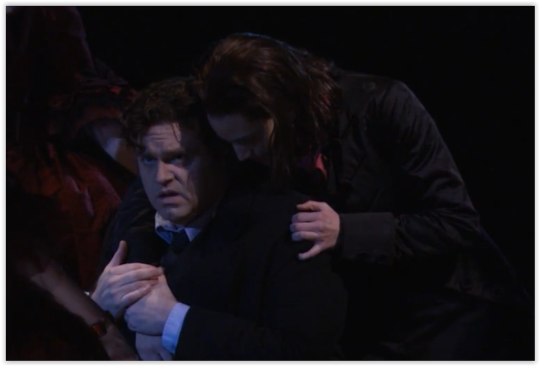
These two have a special relationship.
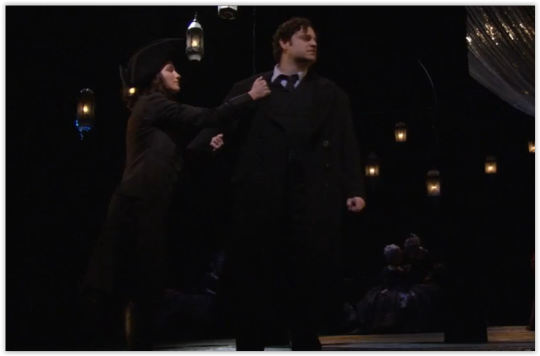
They’re always up to something, and though he may not be aware--or grateful-- Hoffmann can always rely on his friend, whether it’s the invisible Muse or the irrepressible companion, Niklausse.
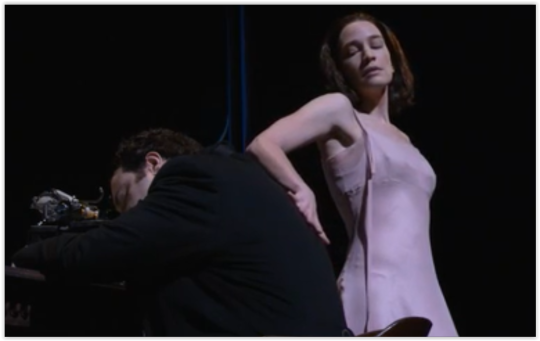
But primarily, the Muse is determined to make sure Hoffmann stays on track--
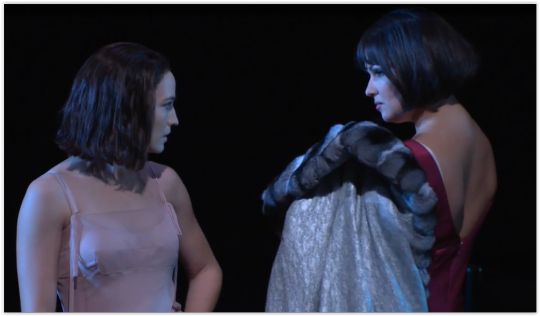
even if that means meddling in his love life.
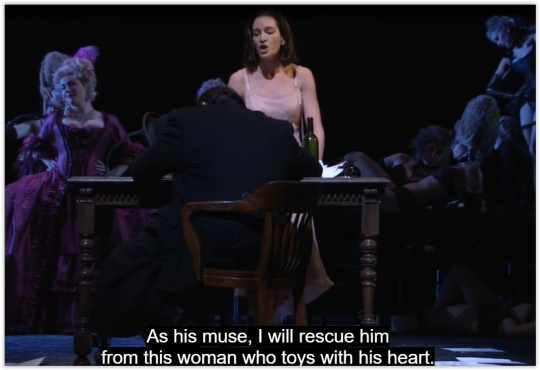
To the Muse, Hoffmann’s genius is more important than any love that may come his way.
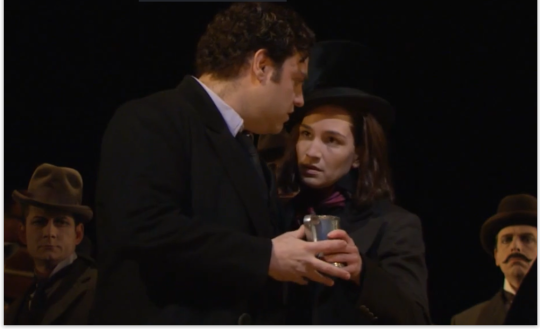
Disguising as a student and friend of Hoffmann, the Muse is always there to help, even if it’s just to give him his drink. Besides, keeping him occupied with booze helps distract him from the ladies, instead using his creativity to spin his tales.
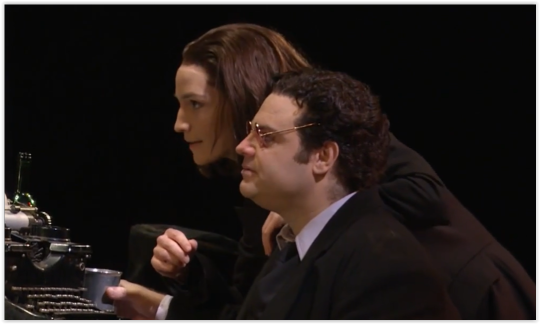
No matter where they end up, the Muse continues to guide and prompt, pointing out details that Hoffmann may prefer not to see.
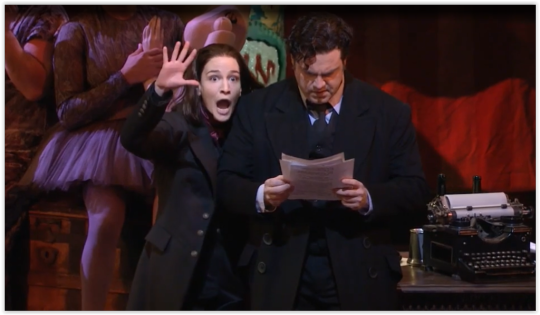
But not every moment is completely serious.
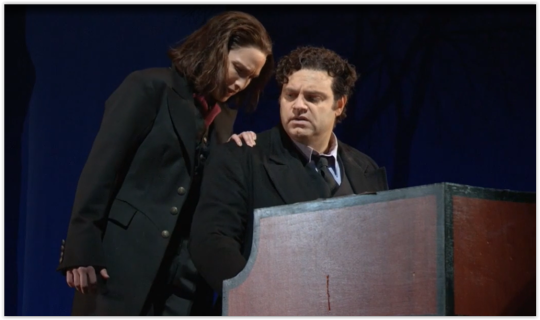
Though some do hit harder than others. No one said it’s easy being a Muse. Sometimes the greatest sacrifices you inspire are your own.
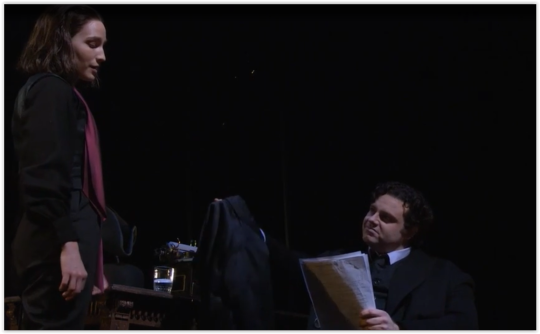
He doesn’t always admit it, but Hoffmann is glad to have a friend--
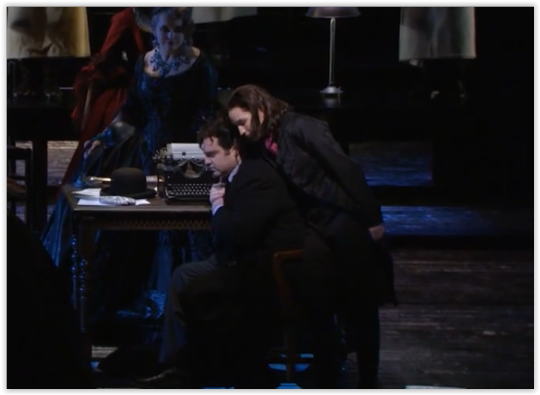
especially when he really needs it.
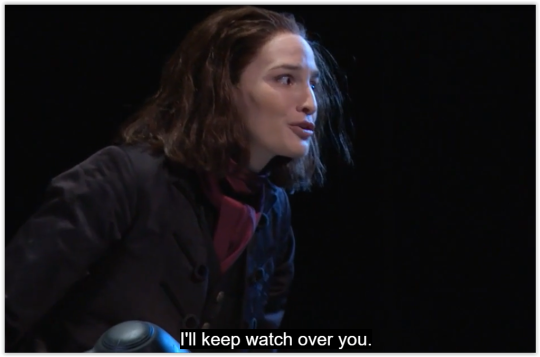
Devoted, sassy, and irreverent, the Muse never loses sight of the goal
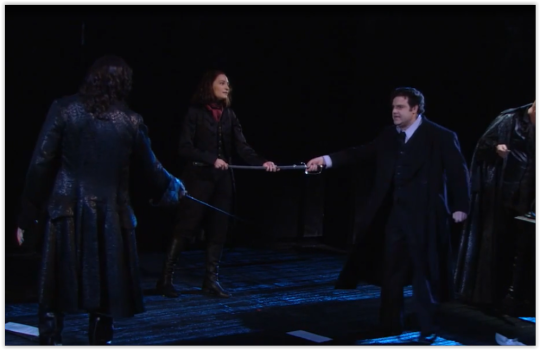
even if that means goading Hoffmann into trouble;

because no matter the outcome, the Muse is always there to comfort and guide--
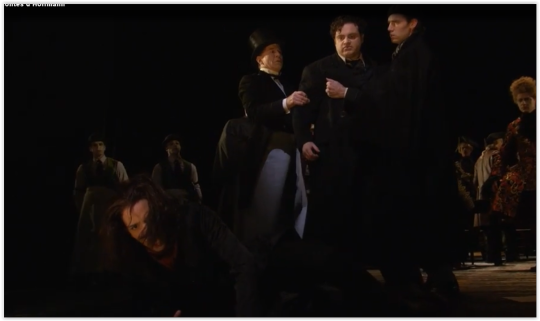
something the master could be a little more grateful for.
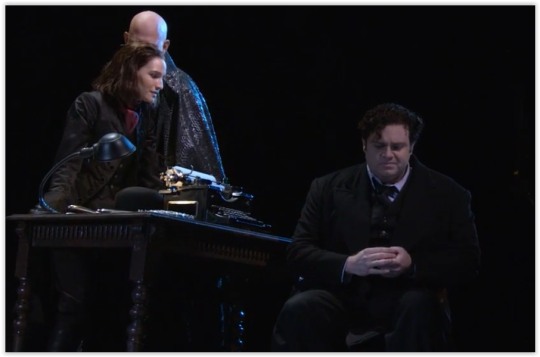
But despite the troubles, the Muse never backs down.
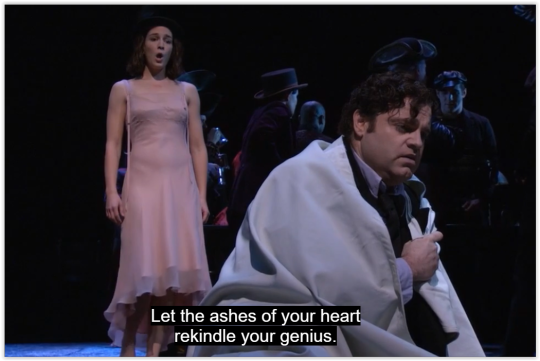
Because what matters most in the end is that Hoffmann’s creativity is able to be shared with the world.
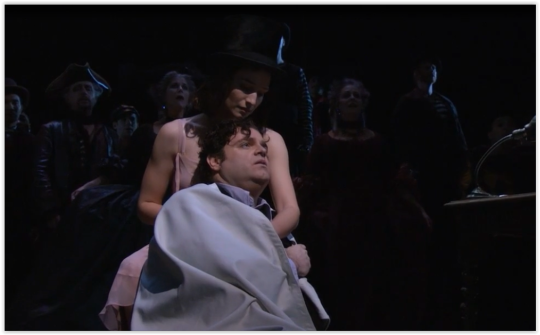
And through hell and heartbreak, the Muse will always be there.
#Les contes d'Hoffmann#the tales of hoffmann#Muse#opera#opera tag#jaques offenbach#jules barbier#michael carre#character analysis#lit crit#this one gets me so emotional#monotonous minutia#is it lit crit if it's visual media?#this took a lot out of me tbh#trouser role#kate lindsey#mezzo#mezzosoprano#monotonous-minutia does lit crit
23 notes
·
View notes
Text
Les contes d’Hoffmann (Munich 2011) pt. 4
More reactions but fewer pictures
So this version was very interesting. First, it was a mixture of spoken dialogue, recit, and sung dialogue between the big numbers. So that made the dialogue kind of mixed-up as it was a patchwork of the versions I’m used to.
Then, there were some pieces missing, some new pieces, and familiar pieces that were shortened or slightly different. The Septet in Act 3 was gone completely, which is supposedly more authentic, but it would have been interesting to see how this cast handled it, especially Damrau, because she’s a goddess. But the way they did Act 3 wouldn’t have had room for it anyway. More on that later.
This production was very Niklausse-centric (100% okay with me since he is my favorite character). Brower is overall fantastic in this role and gives us a really layered portrayal of the character. I was a little concerned at first when there was no costume change between Niklausse and the Muse because I saw that in another one once and it was handled very, very poorly. But they pulled it off here and in some ways it made everything more gay because he was Niklausse the entire time, and is literally declaring his love for Hoffmann while in male form so it’s like...obviously. How can anyone watch this opera and not understand that it is gay.
It focused on Niklausse a lot--he was even listed in the credits before Hoffmann. In some productions I see the camera tends to focus on everything but Niklausse and we only see him when he’s talking or doing something important. But this time the camera followed him around almost more than it followed Hoffmann. I really think they were embracing the idea that this is actually his story. I mean, he gets the opening and the closing numbers, and all of his motivation comes out within the first five minutes of the opera. The overall plot is him watching Hoffmann’s love life thwarted over and over and in every single act he has a moment where hes making it painfully obvious that he wants Hoffmann for himself. It’s easier to forget that in the shortened versions which is why I like the extended ones the best. The only time the camera DOESN’T flip over to Niklausse every couple seconds in this one is, ironically, one of the most important moments: when he runs away from Pitichinaccio in Act 3 after being kidnapped. Apparently that’s when he saw Giulietta take Hoffmann’s reflection and somehow figured out how to fix it by the time he made his way back.
In this one Niklausse is ALWAYS doing something. The only other one I’ve seen where he’s this busy is the Met’s Sher production. He’s all over Hoffmann, all the time. He’s running around being adorable. He’s spying on the other characters. He’s eating a popsicle while watching Hoffmann serenade Olympia. He’s giving Lindorf the roses Stella left for Hoffmann and helping him cut off the stems, just to be spiteful. He REALLY does not like these ladies. He can laugh at Olympia because she’s a robot, but boy does he hate Giulietta. At some points he looks like he’d like to go fight her himself. But he’s too busy keeping Hoffmann out of trouble...as best as he can.
I loved Villazón as Hoffmann. This was my first time seeing him in a comic role. I wasn’t sure how he’d handle it, because sometimes it’s hard for actors to go from one type of role to another. Also, though, Hoffmann is kind of a comic and dramatic role. Villazón manages to match them both. I love his ridiculous dance moves in the Olympia act and his awkward, smoky flirting with Giulietta in Act 3. He seems consistently irritated with Niklausse but he also kind of has RBF anyway. The only thing I’m missing is his interactions with the villains. They take out the entire insult duet that they’re supposed to have in the prologue and a section of the Trio des yeux in Act 1, as well as their interactions before and after Schlemil’s death because they did it so differently. Because of these a lot of their interaction is missing, which takes a lot away, I feel. Especially a shame because Relyea is fantastic as the villains, taking on each persona with ease and making them totally believable as incarnations of the same person. His Miracle was phenomenal. I got so many chills.
Damrau. OH MY GOD ahhhhhhh. She’s so fantastic I can’t handle it. I love her so much. I flipped out when I saw she was playing ALL the heroines. Hot damn. She did it so well. Like I would have believed it was actually four different people because of how well she encapsulated all the characters. Her fierce, broken Antonia, her blank-faced, flighty Olympia, and her seductive, malicious Giulietta were all so well done. She had an interesting portrayal of Stella--usually I see her as kind of a snooty figure, or dismissive, but this one seemed really sympathetic. She doesn’t have any lines in this one, but she’s so expressive as she sneaks into Hoffmann’s room in the prologue to leave him the letter, and again in the epilogue only to find him dead drunk and having torn up the picture and flowers she gave him. I actually felt really sorry for her.
And of course her signing is phenomenal. EEEEEK. She gets all of Olympia’s coloratura on point and her Antonia is so wistful and her duet with Miracle was phenomenal. And Giulietta was ridiculously sexy and she got a whole new number which is awesome because in some versions the character doesn’t really have a lot to do, and the song, though it was short and not in itself spectacular, let Damrau continue to show off her skills.
I’m going to take a moment to talk about the poison scene for my own edification. In the Wikipedia and Britannica summaries of this opera, both describe Act 3 (Giulietta) ending with Dapertutto trying to poison Niklausse because he’s tired of him constantly rescuing Hoffmann, but Giulietta drinks the poison instead and dies. I have never seen a production where this happens, or read a version of the libretto where it does, so I don’t know where that comes from. There IS a part in the original play (of the same title) at the end of Act 3 where this happens: Hoffmann wants to see Giulietta, Niklausse (who is called Friederick in the play...I do not know why) tells him he’s going to get a ride for them and drag him home of he has to. Dapertutto goes to Hoffmann to try and convince him to go to Giulietta because it’s all part of his plan; Hoffmann tells him he can’t because Friederick is coming back, and Dapertutto gives Hoffmann a sleeping potion to give to Friederick. It turns out to actually be poison and Giulietta drinks it before Friederick gets back. But again nothing like that has ever happened in any production I’ve seen. I’ve seen her get stabbed plenty of times but this is the only one where she drinks poison and it’s not even close to what happened in the play so idk how it even got here. But it was an interesting device and it suited this production. I just wish we could have seen the moment where Niklausse breaks free from Pitichinaccio and runs out.
The set was so great. I loved it. Like Sher’s, it did a great job of balancing the comic and the dramatic parts of the opera. Act 1 was all pastel colors and patterned wallpaper, vibrant, eccentric costumes and bright lighting. Act 2 was dark and sombre, and the house was crowded with furniture and a bunch of giant books which really helped me feel the suffocation that Antonia was experiencing. And Act 3 was open, dimly lit, and had that huge mirror. There was a distinct divide between the two spaces--Giulietta’s room and the hallway--but there was no wall, so seeing the action on both sides, but not having them interact or being very aware of each other, was a really interesting dynamic, especially in the Hoffmann/Giulietta duet where they’re in the room getting saucy and Niklausse is stuck outside with Pitichinaccio, staring at the door. And then the prologue and epilogue, going back and forth from the tavern to being Hoffmann’s room in what appears to be a hotel (or maybe an apartment). The fact that those two sets are really similar though, and travel right into each other, adds to the feeling of intimacy; Hoffmann is letting the others into his life, even as he enters their space (the tavern).
I can’t get over Niklausse coming out of the wine cabinet. And Hoffmann not thinking twice about it. Was he just too drunk to think it was weird? Or is he used to Niklausse hanging out in strange places? Also Lindorf didn’t seem to think it was odd that Niklausse tagged along for his aria or took his hat for him or helped him cut up the roses. It’s interesting because there are some versions where there’s a bit of an association between the two, because they have similar goals but different methods (though there is a notable exception to this, but that is a rant for another day). Sometimes I wonder if Lindorf has any idea that Niklausse is also the Muse. Here it’s left ambiguous, but also Lindorf doesn’t have a lot to do, because his duet with Hoffmann is cut short and he doesn’t talk in the epilogue at all.
There are literally no two Hoffmanns that look alike. I’ve seen several, and even revivals of old productions sometimes have differences. There’s literally a whole book about it (which I most definitely did not spend a ridiculous amount of money to buy). Even so, this was the most interesting edit I’ve stumbled upon. It would have helped to have English subtitles so I could better understand the parts I wasn’t familiar with, though I was able to use Google Translate at some points.
Overall this was solidly one of my favorites. Niklausse was surprisingly adorable, despite looking creepily similar to Hoffmann. It was quite gay, but not as angsty as some others, because Niklausse was rarely in doubt of his ability to win the day--even during the Violin Aria; he recovered fairly quickly. Only in the Giulietta act did he seem to be nearing the end of his rope, so tired of Hoffmann’s BS and having to constantly drag him out of trouble. They have an interesting device throughout where Niklausse writes in a notebook at the beginning and end of each act, as if he’s recording their adventures. He’s positively giddy in the epilogue when the book is finished, to the point that he just laughs when Hoffmann yells at him. He has what he wants and he knows he won. I am a sucker for the angst, though, and am known to destroy myself by repeatedly watching various renditions of the Violin Aria that break my heart. This one could have been gayer in that sense, but again, the way Niklausse is portrayed in general is super gay and the fact that Villazón plays Hoffmann as pretty gay too helps in that area.
Also I will never get over this picture.
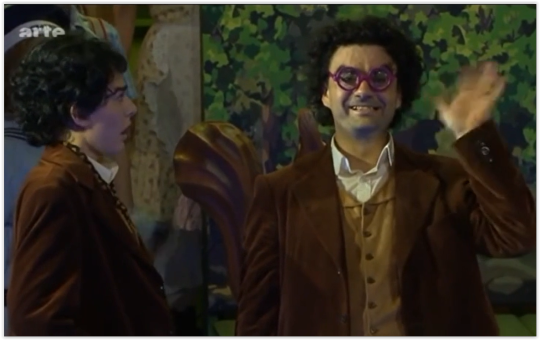
I’ll leave you with that.
#Les contes d'Hoffmann#The Tales of Hoffmann#opera#opera tag#Jaques Offenbach#Jules Barbier#Michael Carré#opera reactions#opera analysis#monotonous-minutia reacts#monotonous-minutia does lit crit#is it lit crit if it's visual media?#monotonous minutia critiques
5 notes
·
View notes